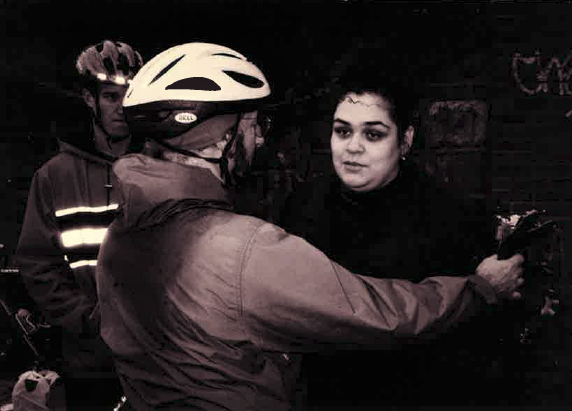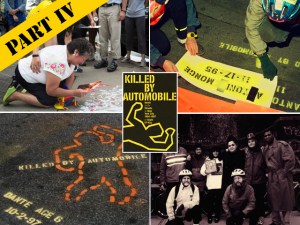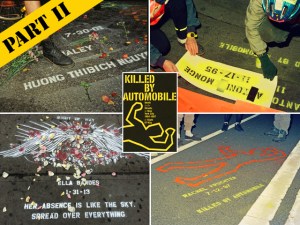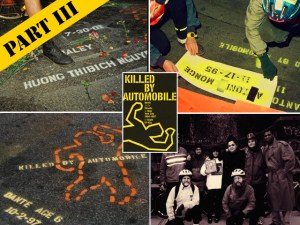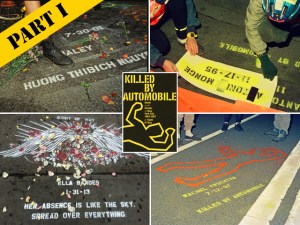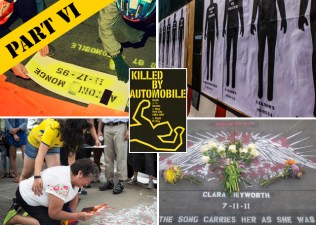The History of a Movement, Postscript: Notes on This Series
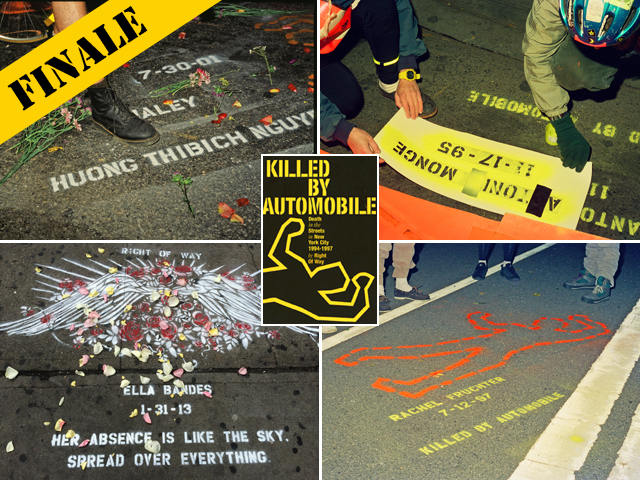
Amid the bloodiest year in Mayor de Blasio’s Vision Zero, Streetsblog today concludes its seven-part series focusing on a key strand in the movement for livable safe streets, written by a central figure in that movement, Charles Komanoff. A former head of Transportation Alternatives, Komanoff 25 years ago launched a highly effective public awareness campaign calling out the daily carnage on New York City streets. Under the name “Right Of Way,” his group brought the brutal reality of pedestrian and cyclist deaths to the public eye in the form of high-visibility street actions (including one arrest). Part I opened with the first “Killed by Automobile” stenciling in December 1996. Part II focused on how the movement began to generate press coverage. Part III looked at how the movement branched out. Part IV looked at the publication of the book, “Killed by Automobile.” Part V offered a sobering look at what happens when the car culture pushes back. Part VI looked at a revival of activism in the early 2010s.

- Right Of Way (2013-2015) showcases our brief, but spirited, renaissance in the last decade. Along with the cornucopia of stenciling covered in Part VI of this series, “Remembrance and Hope,” the site displays our direct action campaigns for lower speed limits, protected midtown bike lanes, and more. Visually, it’s a profusion of photos and videos and includes the time we photo-bombed the Verrazano Bridge 50th anniversary celebration to demand bike and pedestrian paths.
- Cars Suck (1996-circa 2004) was the website for Right of Way’s original incarnation. Its primary interest today is as the repository of dozens of op-eds (NY Times, Daily News, Newsday) and “unprintable essays” by RoW members during that heyday. The site also houses rare gems like the Toronto Regional Coroner’s 1998 recommendation to amend Canada’s Highway Traffic Act to give cyclists precedence over drivers in any ambiguous road encounter. Anyone wanting a taste of hard-core anti-car consciousness on either side of the new millennium should make a beeline to these pages.
- Komanoff.net/cars_I (1996-present). This page from my website curates three decades of my research tracts and opinion pieces critiquing car hegemony and traffic violence. They range from early pieces imbued with pre-RoW stirrings to my recent elegiac The Last Seconds in the Life of Jose Alzorriz and the combative Disband NYPD’s Collision Investigation Squad; and from Right of Way memorabilia to my 2004 manifesto calling for a “Traffic Justice Policy Project” to mobilize against traffic violence nationwide. It’s also the go-to page for definitive editions of RoW’s Killed By Automobile booklet covered in Part IV of this series, and The Only Good Cyclist report summarized in Part V.
During the past year, several of my Right of Way collaborators shared with me their dismay that the 2020 book, “Right Of Way: Race, Class and the Silent Epidemic of Pedestrian Deaths in America,” made no mention of our labors to un-silence that epidemic — despite the fact that the book’s title was appropriated from our group. Throughout 2019, the author spurned repeated invitations to discuss our work and possibly reference it in her in-progress book. Whether that was from laziness or because our unvarnished anti-auto line of attack might have subverted the book’s “race and class” lens, we do not know.
A tour of any of the three Right of Way sites could easily induce a sense of melancholia. So many campaigns that fell short! — NYC home-rule for speed cams and limits … enacting the “Toronto Coroner’s Rule” into traffic law … coercing NHTSA and NTSB to design road safety into vehicles by mandating readable “black boxes,” smaller side-view mirrors on pickups, and a hundred other reforms.
So it goes for all work to expand justice. The bread you cast upon the waters with your vote or your feet or your artist’s brush rarely comes back to you in any obvious way. That’s true for immigrant rights and reproductive rights, for Black Lives Matter and climate justice. You do the work not only to change the world but because fighting for social change is what it means to be human.
It is also, often, uplifting, as we found through Right of Way. Albert Camus’s novel, The Plague, published in 1947, the year of my birth, imagines the actions of residents of the Algerian port city of Oran as a deadly contagious disease sweeps through the city. The main character, a physician, puts himself at the front lines of the resistance, which is at once futile and ennobling. Resistance and struggle, and also caring, are not just heroic but the actions that give meaning to our lives.
